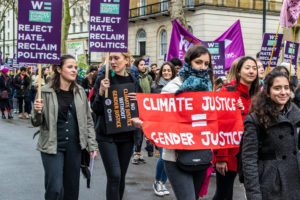By Britta Kallin and Sabine von Mering
I call on women to speak out and lead the way. We cannot wait, we have to act. Our children’s and grandchildren’s future is at stake.
Mary Robinson, Former President of Ireland

Feminists have embraced intersectional inquiries for a long time, integrating frameworks developed by women, minorities, the disabled, and other underrepresented groups. When society equated women and nature, feminist scholars responded with ecofeminist analyses. For half a century, ecofeminists have examined the implications of the destruction of the planet for women and girls. Ecofeminists have also analyzed connections between our capitalist economic system, patriarchy, colonization, right-wing and fascist groups, domestic abuse, suppression of women’s rights, and genocide. Feminist activism has been part of several waves of women’s movements and hands-on activism for more political participation and attention to the concerns of all who do not identify as male, be it by getting the right to vote one hundred years ago, fighting for abortion rights in the 1960s and 70s, and by joining LGBTQIA* activists since the 1980s.
